|
|
|
Sort Order |
|
|
|
Items / Page
|
|
|
|
|
|
|
| Srl | Item |
| 1 |
ID:
082211
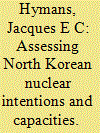

|
|
|
|
|
| Publication |
2008.
|
| Summary/Abstract |
This article develops a novel assessment of the nuclear program of the Democratic People's Republic of Korea. Using a theory-driven approach rooted in comparative foreign policy analysis, the article undermines two common assumptions about the DPRK nuclear threat: first, that the North Korean leadership's nuclear intentions are a measured response to the external environment and, second, that the DPRK has developed enough technical capacity to go nuclear whenever it pleases. In place of these assumptions, the article puts forth the general theoretical hypotheses that (1) the decision to go nuclear is rarely if ever based on typical cost-benefit analysis, and instead reflects deep-seated national identity conceptions, and (2) the capacity to go nuclear depends not only on raw levels of industrialization and nuclear technology, but also on the state's organizational acumen. Applied to the case of the DPRK, these hypotheses suggest that it has long been strongly committed to the goal of acquiring an operational nuclear deterrent, but also that it has been finding it very difficult to successfully implement that wish. The article also demonstrates that these hypotheses are supported by the meager evidence available on this case
|
|
|
|
|
|
|
|
|
|
|
|
|
|
|
|
| 2 |
ID:
112339
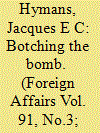

|
|
|
|
|
| Publication |
2012.
|
| Summary/Abstract |
Nuclear weapons are hard to build for managerial reasons, not technical ones. This is why so few authoritarian regimes have succeeded: they don't have the right culture or institutions. When it comes to Iran's program, then, the United States and its allies should get out of the way and let Iran's worst enemies -- its own leaders -- gum up the process on their own.
|
|
|
|
|
|
|
|
|
|
|
|
|
|
|
|
| 3 |
ID:
091779
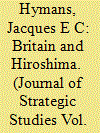

|
|
|
|
|
| Publication |
2009.
|
| Summary/Abstract |
Most historical accounts of the atomic bombings of Japan show little interest in Britain's explicit authorization for the attacks. Meanwhile, the few historians who have attempted to explain it rely on a unitary, rational actor model of the British state that is misleading. This article demonstrates that high-ranking British officials became anxious early on about the strategic consequences of a peremptory use of the new weapon. Therefore, especially over the course of 1944 they sought to engage Washington on the linked questions of the bomb's wartime use and its postwar control. However, these officials' initiatives were rebuffed by Prime Minister Winston Churchill, who paved the way to the bombings based on a fervent desire for Anglo-American integration, and on a dim understanding of the bomb's revolutionary potential
|
|
|
|
|
|
|
|
|
|
|
|
|
|
|
|
| 4 |
ID:
064470
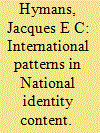

|
|
|
|
|
| Publication |
May-Aug 2005.
|
|
|
|
|
|
|
|
|
|
|
|
|
|
|
|
| 5 |
ID:
118372
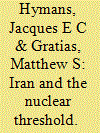

|
|
|
|
|
| Publication |
2013.
|
| Summary/Abstract |
This article clarifies and evaluates the intellectual underpinnings of the respective military red lines that Western leaders have drawn against Iran's developing nuclear program: (1) the red line of "no Iranian nuclear weapon"-the stance that has been embraced by President Barack Obama- and (2) the red line of "no Iranian nuclear weapons capability"-the stance that has been embraced by Israeli Prime Minister Benjamin Netanyahu and many prominent American Iran hawks. We contend that the key intellectual divide between these stances is that the Netanyahu view implicitly assumes that a "significant quantity" (SQ) of highly enriched uranium is essentially equivalent to a bomb because an explosive nuclear test is technically unnecessary, whereas the Obama view implicitly assumes that if and when Iran gets to the point of being technically and psychologically ready to assemble a nuclear weapons arsenal, it will conduct a test. We show through theoretical and empirical analysis that the likelihood that Iran will choose an "Israeli-style" policy of creating an arsenal of untested but operational nuclear bombs is very low. Therefore, Obama's red line is more intellectually defensible than Netanyahu's.
|
|
|
|
|
|
|
|
|
|
|
|
|
|
|
|
| 6 |
ID:
187488
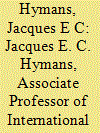

|
|
|
| 7 |
ID:
078720
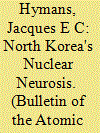

|
|
|
| 8 |
ID:
104078
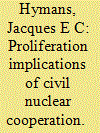

|
|
|
|
|
| Publication |
2011.
|
| Summary/Abstract |
Programs of international civil nuclear cooperation-of "Atoms for Peace"-have come under growing criticism for unintentionally fostering nuclear weapons proliferation in developing countries. However, drawing on the literature on international technology transfer and on Albert Hirschman's theory of exit, voice, and loyalty, this article argues that Atoms for Peace efforts may often seriously hamper developing countries' nuclear weapons ambitions by empowering their scientific workers and by facilitating the brain drain to the developed world. The article then presents a case study of the historical nuclear program of Yugoslavia, which received very generous help from the Atoms for Peace programs of the United States, Soviet Union, and European states at a time when nonproliferation controls were minimal. The international ties of the Yugoslav nuclear program made its scientific workers much less likely to choose simple loyalty to the Tito regime, and much more likely to choose voice or exit, accelerating the program's ultimate collapse.
|
|
|
|
|
|
|
|
|
|
|
|
|
|
|
|
| 9 |
ID:
073473
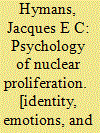

|
|
|
|
|
| Publication |
Cambridge, Cambridge University Press, 2006.
|
| Description |
xii, 273p.
|
| Standard Number |
0521616255
|
|
|
|
|
|
|
|
|
|
|
|
Copies: C:1/I:0,R:0,Q:0
Circulation
| Accession# | Call# | Current Location | Status | Policy | Location |
| 051572 | 327.1747/HYM 051572 | Main | On Shelf | General | |
|
|
|
|
| 10 |
ID:
076709
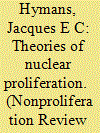

|
|
|
|
|
| Publication |
2006.
|
| Summary/Abstract |
Traditionally, American thinking on proliferation - whether by scholars or practitioners - has been dominated by the realist camp. According to this view, nuclear weapons are very valuable to states, so only strong supply-side control measures can stop the world's natural tendency toward rampant proliferation. However, realist intuitions have proven a very poor guide to the historical realities of nuclear proliferation. Therefore the idealist camp, which takes a different approach particularly to the demand side of the proliferation equation, has become increasingly prominent in academic circles and even in the policy world. Idealists are exploring the question of the demand for the bomb at three levels of analysis: international, domestic, and individual. This new research avenue is a very positive development, but idealism has its own potential pitfalls.
|
|
|
|
|
|
|
|
|
|
|
|
|
|
|
|
| 11 |
ID:
107652
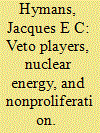

|
|
|
|
|
| Publication |
2011.
|
| Summary/Abstract |
The basic insight of the "veto players" literature from comparative politics-the more veto players, the more policy rigidity-has been nearly absent from the study of nuclear proliferation. Yet, when states need mutual agreement among a large number of veto players, this greatly lengthens the odds against radical nuclear policy change. The veto players perspective helps to explain the historical resilience of Japan's fifty-year pursuit of a complete nuclear fuel cycle for exclusively peaceful purposes. Although a long line of Japan observers have focused on statements by Japanese politicians suggesting the possibility of redirecting some of the country's large nuclear estate toward military ends, Japan's traditional nuclear policy has in fact become increasingly entrenched over the years, given the rising number of institutionalized veto players in its nuclear policymaking arena. This point is relevant not only to the long-standing question of whether Japan will acquire nuclear weapons, but also to the post-Fukushima disaster question of whether Japan will exit the nuclear field entirely.
|
|
|
|
|
|
|
|
|
|
|
|
|
|
|
|
| 12 |
ID:
093564
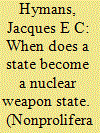

|
|
|
|
|
| Publication |
2010.
|
| Summary/Abstract |
When does a state become a "nuclear weapon state"? How we choose to answer this question has significant implications for proliferation assessment, analysis, and policy. Traditionally, the standard demarcation line has been a state's first nuclear test, but in recent years analysts have increasingly focused instead on the accumulation of a significant quantity (SQ) of fissile material. The article argues that although the test/no-test indicator clearly has problems, its replacement by the SQ/no-SQ indicator would be highly counterproductive. The article instead proposes supplementing the traditional test/no-test indicator with a theory-driven approach that focuses on the incentives and disincentives to test.
|
|
|
|
|
|
|
|
|
|
|
|
|
|
|
|
|
|
|
|
|